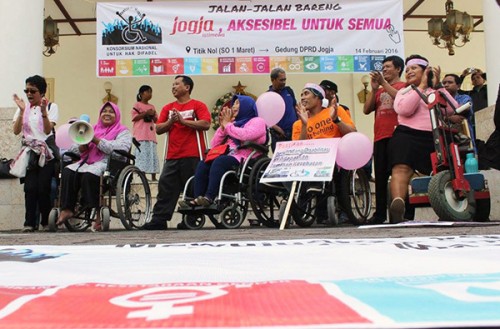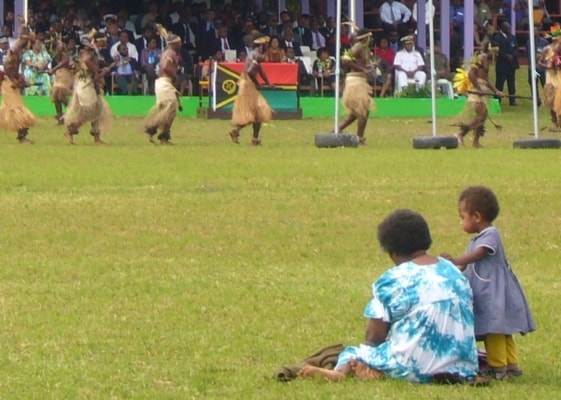Image: The National Consortium for Disability Rights (KONAS), which involves Peduli partners.
In a follow-up to Luke Arnold’s recent post on coalitions for disability inclusion in Indonesia, Angie Bexley introduces a broader initiative in which reform coalitions are working for the inclusion of six marginalised groups.
Indonesia has become a middle income country, yet inequality is on the rise. The government recognises that rising inequality hinders economic growth and social cohesion, and it aims to reduce the country’s Gini Coefficient from its 2014 high of .41 to .36 by 2019. But what about those who are systematically disadvantaged through discrimination? What will shift both the fact of social exclusion and the attitudes that sustain it?
Program Peduli is designed specifically to improve social inclusion outcomes for six of Indonesia’s most marginalised communities: people with disabilities, religious minorities, victims of past human rights abuses, remote and indigenous peoples, vulnerable children, and transgendered people (waria). It is a Government of Indonesia community development program supported by DFAT, and it works with civil society organisations in 84 districts.
At the core of the approach is a Theory of Change process. When the second phase of the program was launched in 2014, the first step taken was to invite local CSOs to workshops to discuss the local context and possible local solutions, facilitated by The Asia Foundation, the program’s managing partner. Many of the CSOs were experts on a particular minority but had not yet looked at that group in the context of social inclusion; instead they tended to design highly targeted programs that risked ignoring the surrounding community and political economy.
CSO participants were asked to focus on three elements of their work: the most common types of social exclusion that affected their particular marginalised community; the most significant actors involved in both exclusion and inclusion; and the types of social change they thought most important in facilitating inclusion.
To better understand how NGOs define exclusion and the approaches they use to address it, a recent meta-analysis examined the Theory of Change papers from workshops with 68 CSO partners.
The most common manifestation of social exclusion, as defined by the CSOs, could be laid at the door of central government – difficulty accessing official documents, particularly legal identity documents and birth and marriage certificates. Lack of these documents creates barriers to all sorts of public services – education, health and social welfare, land ownership. People find themselves shut out from many opportunities to earn a living, and certainly from any hope of state employment.
Yet the CSOs reported that the ‘key excluders’ vary from minority to minority. For waria, people with disabilities and vulnerable children, leading excluders are likely to be family members. Most minority groups are excluded from economic opportunities and local decision-making processes by their neighbours and communities. Some are excluded by the state at different levels, such as indigenous communities whose land rights are not secure, and victims of gross human rights violations whose status remains unacknowledged. And some groups are more likely to self-exclude because they have been excluded from many layers of society, and that feeds into a perpetual cycle of community exclusion.
When asked to identify key agents for change and rate their importance, the CSOs ranked the marginalised themselves 2.5 times higher than other likely initiators of inclusive change. However, the workshop participants also believed that no single group or individual could generate inclusion alone. The CSOs identified that motivation and capacity within the excluded group needs to be matched by active support from others outside it – other civil society groups, local governments committed to implementing policies, and positive media coverage.
In other words, workshop participants came to the conclusion that where highly targeted programs addressing discrete minority issues had failed to address social inclusion, coalitions for change – or, in this case, coalitions for inclusion – might fill the gap by involving many elements of the government and civil society.
This perspective is now reflected in Program Peduli programming. A year in, it seems that building coalitions for inclusion has indeed become the CSOs’ chief approach. The program has so far reached over 30,000 of the marginalised poor and provided more than 10,000 people with access to health services, legal identity and employment assistance.
While the approach in each of the program’s current 82 locations reflects the variation of exclusion faced by marginalised communities, there are a few common threads. Each has established a community learning forum which emphasises the participation of the whole community, from religious leaders, concerned citizens and others among the urban or rural poor, to the private sector. And each group is formally legalised, which brings official recognition and provides members with all-important access to decision-making, local budgeting and planning forums. This is the critical step that aims to link community efforts to sustainable and long-lasting systemic change.
Program Peduli’s support to Disability Forums has helped empower people with disabilities to drive inclusive governance at the village and district levels. This approach diverges from conventional disability-related programming that tends to focus on rehabilitation or income generation without addressing cultural attitudes that keep people with disabilities in a cycle of social exclusion. Through the Disability Forums, their inclusion has been cemented in government budgeting and planning processes. The forums have connected them to other people with disabilities, the wider community, and other civil society organisations. A sign of the shift in cultural attitudes is the appointment of a person with an impairment as a village head. He has catalysed further change, including greater prioritisation of disability-inclusive development by the sub-district and district level governments.
The departure of such initiatives from the traditional focus of inclusion efforts on service outcomes shows how coalitions may be able to prompt transformation – of communities and mindsets. While Program Peduli’s second phase has only been operational for a year, robust emerging evidence suggests that results have a good chance of outliving the program itself.









